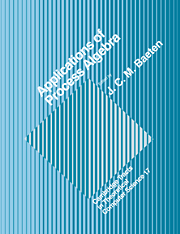Book contents
- Frontmatter
- Preface
- Contents
- An introduction to process algebra
- Two simple protocols
- Proving mutual exclusion with process algebra
- Process algebra as a tool for the specification and verification of CIM-architectures
- A process creation mechanism in process algebra
- Correctness proofs for systolic algorithms: palindromes and sorting
- Verification of an algorithm for log-time sorting by square comparison
- On the Amoeba protocol
- Process algebra semantics of POOL
- Some observations on redundancy in a context
- A modular approach to protocol verification using process algebra
- Index of concepts
- Index of names
- Index of symbols and notation
An introduction to process algebra
Published online by Cambridge University Press: 03 December 2009
- Frontmatter
- Preface
- Contents
- An introduction to process algebra
- Two simple protocols
- Proving mutual exclusion with process algebra
- Process algebra as a tool for the specification and verification of CIM-architectures
- A process creation mechanism in process algebra
- Correctness proofs for systolic algorithms: palindromes and sorting
- Verification of an algorithm for log-time sorting by square comparison
- On the Amoeba protocol
- Process algebra semantics of POOL
- Some observations on redundancy in a context
- A modular approach to protocol verification using process algebra
- Index of concepts
- Index of names
- Index of symbols and notation
Summary
This article serves as an introduction to the basis of the theory, that will be used in the rest of this book. To be more precise, we will discuss the axiomatic theory ACPT (Algebra of Communicating Processes with abstraction), with additional features added, which is suitable for both specification and verification of communicating processes. As such, it can be used as background material for the other articles in the book, where all basic axioms are gathered. But we address ourselves not exclusively to readers with previous exposure to algebraic approaches to concurrency (or, as we will call it, process algebra). Also newcomers to this type of theory could find enough here, to get started. For a more thorough treatment of the theory, we refer to, which will be revised, translated and published in this CWI Monograph series. There, most proofs can also be found; we refer also to the original papers where the theory was developed. This article is an abbreviated version of reference.
Our presentation will concentrate on process algebra as it has been developed since 1982 at the Centre for Mathematics and Computer Science, Amsterdam (see), since 1985 in cooperation with the University of Amsterdam and the University of Utrecht. This means that we make no attempt to give a survey of related approaches though there will be references to some of the main ones.
This paper is not intended to give a survey of the whole area of activities in process algebra.
We acknowledge the help of Jos Baeten in the preparation of this paper.
- Type
- Chapter
- Information
- Applications of Process Algebra , pp. 1 - 22Publisher: Cambridge University PressPrint publication year: 1990
- 1
- Cited by

